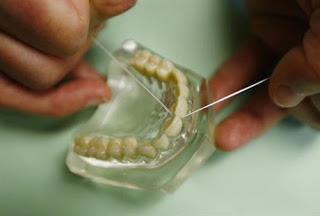Feds drop advice to floss after finding scant scientific evidence that it helps, but dentists still recommend it as ‘low cost, low risk’

 |
| A flossing demonstration (Associated Press photo: Julio Cortez) |
Flossing might help you have better oral health. But there’s no proof of it, despite decades of recommendations by dental experts, the federal government and, yes, manufacturers of floss.
Federal advice is supposed to be based on scientific evidence, so Jeff Donn of The Associated Press asked federal agencies for the evidence. They didn’t reply immediately, but when they issued their latest dietary guidelines this
year, “the flossing recommendation had been removed, without notice,” Donn reports. “In a
letter to the AP, the government acknowledged the effectiveness of
flossing had never been researched, as required.”
Donn examined “the most rigorous research conducted over the past
decade, focusing on 25 studies that generally compared the use of a
toothbrush with the combination of toothbrushes and floss,” he writes. “The evidence for flossing is ‘weak, very unreliable,’ of ‘very low’ quality, and carries ‘a moderate to large potential for bias.'”
Flossing is often cited as a way to remove plaque, but “The majority of available studies fail to demonstrate that flossing
is generally effective in plaque removal,” said a review conducted
last year. “One study review in 2011 did credit floss with a slight reduction in
gum inflammation — which can sometimes develop over time into
full-fledged gum disease,” Donn reports. “However, the reviewers ranked the evidence as ‘very unreliable.’ A commentary in a dental magazine stated that any
benefit would be so minute it might not be noticed by users.”
Wayne Aldredge, president of the American Academy of Periodontology, “acknowledged
the weak scientific evidence and the brief duration of many studies,” Donn writes. “In
an interview at his private practice in New Jersey, he said that the
impact of floss might be clearer if researchers focused on patients at
the highest risk of gum disease, such as diabetics and smokers. Still, he urges his patients to floss to help avoid gum disease.” He told Donn, “It’s like building a house and not painting two sides of it. Ultimately those two sides are going to rot away quicker.”
“Aldredge also said many people use floss incorrectly, moving it in a
sawing motion instead of up and down the sides of the teeth,” Donn reports. “Floss can occasionally cause harm. Careless flossing can damage gums,
teeth and dental work. Though frequency is unclear, floss can dislodge
bad bacteria that invade the bloodstream and cause dangerous infections,
especially in people with weak immunity, according to the medical
literature.”
But Tim Iafolla, a dentist with the National Institutes of Health, told Donn that Americans should still floss: “It’s low risk, low cost. We know there’s a possibility
that it works, so we feel comfortable telling people to go ahead and do
it.”